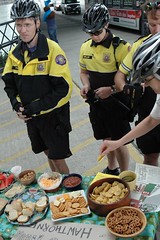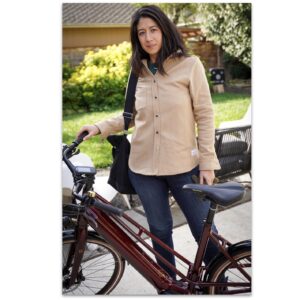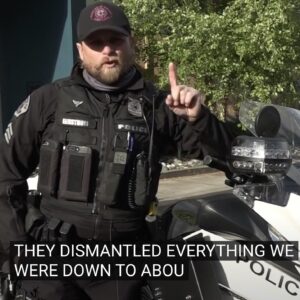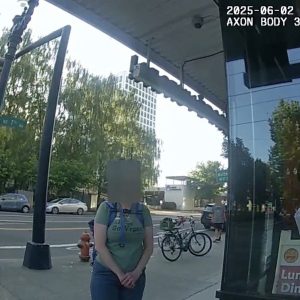Do you think Portland would be a better place if we had more cops patrolling our neighborhoods on bikes rather than in cars and on motorcycles?
I do. I strongly believe that more bike patrols would be a great way to deal with our neighborhood safety issues.
Yet despite their effectiveness and popularity in the community, currently only two of the five Metro-area precincts (Central and Southeast) have an active bike patrol.
During my recent bike-along with Southeast Bike Patrol, the officers told me maybe only “a few dozen” officers have done bike patrol out of 900 or so total officers.
This isn’t because Mayor Potter and Chief Sizer don’t like bike patrols (at least I hope that’s not why), it’s because of real financial and human resource constraints.
SE Bike Patrol officer Robert Pickett contacted me to explain the issue and to encourage us to support bike patrols in the upcoming police budget planning cycle:
“A two-officer bicycle patrol costs a lot more money (mostly in the form of officer salaries) and can only cover a much smaller area than one officer in a patrol car.
A bicycle patrol takes personnel away from the pool of officers available to answer 911 calls, making it more difficult to accomplish what most of us would probably consider the most basic of police functions–respond when we call for help. (Bike officers do respond to emergency calls, but only when a call happens to come out within reasonable biking distance from the patrol, which isn’t that often.)
Thus while police bicycle patrols have many positive aspects, they take away resources from other police functions.
Allocation of limited resources is a challenge that faces our leaders constantly, but we can make it easier for them by letting them know what we would prefer.
I would suggest writing letters to your local precinct commander asking about the possibility of creating a patrol if they don’t have one already, or supporting the continuation of one already in place.
More importantly, send messages to your City Council person, the Mayor and the chief suggesting more money be allocated for police bicycle patrols. The next budget cycle is close at hand, so any input they receive in the coming weeks will be quite timely. There is no doubt that positive citizen response played a large part in getting the Southeast bike patrol going.
If you’d like to see more bike patrols in Portland, email Chief Sizer and Mayor Potter (see below), contact your neighborhood’s precinct commander, and make your voice heard at the Police Bureau Budget Meetings coming next month.
===
Info:
- List of neighborhood precincts
- Chief Rosie Sizer – chiefsizer[at]portlandpolice[dot]org
- Mayor Tom Potter – mayorpotter[at]ci[dot]portland[dot]or[dot]us







Thanks for reading.
BikePortland has served this community with independent community journalism since 2005. We rely on subscriptions from readers like you to survive. Your financial support is vital in keeping this valuable resource alive and well.
Please subscribe today to strengthen and expand our work.
I have a number of comments:
1. There is an assumption here that covering a large area in a patrol car means better policing than covering a smaller area by bike. Perhaps, or perhaps not. Big institutions tend to understand what they can measure, and they can measure area covered a lot more accurately than better policing.
2. I’m certainly willing to concede that an officer in a car can respond to most 911 calls faster than on bike. Not always, but many times. So, we’ll always need officers in cars.
3. I hope we can have a positive impact here. For example, I think that our recent problems in North Portland could have been prevented by officers on bikes in the area.
So, the issue comes down to the definition of better policing. I believe that an officer on a bike will help prevent problems – but how do you measure it? If you can’t measure it, then it’s hard to justify the budget.
Good points Richard.
The irony of not spending money of bike patrols because it takes resources from busy motor vehicle and motorcycle patrols… is that if we had more bike patrols, there would be less crime and therefore less stress on resources to begin with!
does that make sense? that’s my opinion/gut feeling.
To me, there is no comparison between bikes and cars/motocycles. Bike officers are leaps and bounds more effective on low-level crime and livability issues… which is what the bulk of our neighborhood problems are.
Not only that, but many larger crimes start small. That is, bike cops can create relationships and gain knowledge in the community that can help spot problems (and trouble-makers) before they have a chance to fester and erupt into more serious issues.
I would say without a doubt if we had more bike patrols (with officers like Robert Pickett) in each precinct this city would see crime rates plummet.
but of course I’m no expert on the issue…
Have a look at this article about bicycle based paramedics: http://www.zerocouriers.com/?p=12 If medics on bikes can get to an injured person faster than an ambulance, then it should be possible for police on bikes to get to a 911 call faster than a patrol car. I’m sure it all depends on how the systems are set up, and light traffic conditions would give the patrol cars more of an advantage, but if a system of bike patrols were in place throughout the city, I think that overall response times could be lowered. I agree, too, that police are much more effective when they are out among people, rather than shut away in patrol cars.
Jonathan,
I’m glad you shared the various perceived limitations of bike patrols (expense, range, etc.), but this article seems to devote most of its copy to that devil’s advocacy and never really explains the considerable value of these patrols that, in my opinion, outweighs those limitations.
As for range, I think officer Pickett is being a little too modest. In fact, if they hopped off the sidewalk and ran some lights (like police cruisers do all the time), bike patrol officers would be first on the scene for quite a few inner-Portland calls.
I hope readers who missed it will go back and read your article about riding with Pickett and Quick. It’s a fine testament to the value of these officers.
I’m working on my letters of support right now.
Also, cops on bikes are much more accesssible to the general public – heck, even motorcycle officers are much more approchable than the guys in the steel and glass auto cage. Studies nationwide have indicated that the more accessible you make the police, and the more feet you put on the streets (meaning number of patrolling officers), the lower the crime rate will drop. We once had a great partnership between officers and the neighborhoods they patrolled. Over the years, that’s degraded into a very adversarial relationship. Like gentrification, poverty and racial issues, there is no simple solution. The way to find the solutions, though, is simple: Encourage and develop local extended relationships between people in a neighborhood. Get people to care again about their next door neighbor at least as much as they do about their online Warcraft buddies.
Borrowing and warping a phrase from the 80’s: “Think local, ACT local!”
Community Policing.
That term is a kind of holy grail in police management circles. When I was briefly a criminal justice major it seemed to be a topic in every class.The idea that something was lost when urban policing went from the foot patrol model to the patrol car is well established. The exact costs of the disconnect between police and the citizens they ostensibly serve may be hard to define, but the overall effect is quite clear.
Officers who zip around a large area “putting out fires” may seem more efficient from some statistical angles, but there are significant negative consequences. Officers operating this way tend to mostly form relationships (using the term loosly here) with criminals. They have very little positive interaction with the rest of an area’s residents and thus the collaborative partnership between citizens and police falters or disappears entirely.
Bikes may well be a happy medium, getting officers out of patrol cars but still allowing them to cover more ground. The bike also offers some advantages in terms of being a stealthy platform, a fact that police have exploited in the past when targeting problem areas.
I am part of my neighborhood’s emergency team, so when I imagine a bike patrol I tend to think of an area about that size. I would imagine that bike officers would quickly become a fixture in our area, known to residents, able to see AND hear problems more easily. It would be an interesting experiment to see if layering an appropriate bike patrol presence with the backup of patrol cars (and perhaps air assets) would radically change the crime rate in a given region of the city.
Ethan, I agree with your comment about police relationships. In the current system, half the people they meet in the line of work are criminals, and half are victims. Personally, that would drive me nuts in about three days. It’s got to affect their (police) view on events. I bet that if they interacted with a broader cross section of the community, they’d be likely to take a more balanced appraoch to some of the bad situations they face. Perhaps there’s be fewer police shootings then. (All speculation on my part)
To find out when and where public budget forums/meetings are, go to http://www.portlandonline.com/communitybudget and look at calendar on right hand side.
You always see old movies with cops walking a beat. One might question why an officer in an area as dense as downtown really even needs a bike. I know how much more information I get from my surroundings on foot vs on a bike, vs in a car, and it is clear to me that a cop in a car is covering a greater area far less effectively. This is reasonable for a sheriff, where a deputy might be expected to cover a whole county by himself at times. For the downtown portland area though a patrol car is counterproductive for every event other than an arrest. One cop can drive a paddy wagon, the rest would be more effective out on foot/bike.
Bjorn
The upkeep alone on just ONE police cruiser over the course of its life in active duty would pay for at least a SQUAD of bike cops.
Do the MATH, people. It’s NOT really about the MONEY. It’s about a whole lot of SMART people UNWILLING.
CRITICAL MASS for Bike Cops, people.
more cops tooling down the sidewalk on crappy mountain bikes? no thanks.
oh…but if barnum and balzer were put on bikes, i’m sure life would improve for the couriers of this city.
the Benton county sheriff’s office stated to me that there primary contact with the public was through traffic stops. Ok so think this through Benton county officers approach cars with hands on guns and ready to shoot. If a cop on a bike who talks to the community he is in and the crime rate goes down because he lends a human face to the law.
How about more bike cops like Quick and Pickett, then?
What’s interesting is that 40% of all police stops are for traffic crashes. By driving in cars, the police merely reinforce the idealogy that cars are inescapable. Thus ensuring that there will always be more crashes, and good job security.
However one town in Florida reduced it’s postal operating costs by $20,000/year by switching most carriers to bicycles (sorry I can’t find the link). Bikes simply cost less. We need government to catch that.
I once saw a mail carrier in St. Pete, FL delivering the mail on a bike.
The only way cops will use bikes on a BIG scale, I’m talking like 2,000 bike cops in Tulsa, OK, or Portland, is for you, the cycling public, to flex your political muscles and make a real BIG stink, ala Critical Mass, on City Hall. Otherwise, NO matter what you say, cheaper, faster, blah, blah, blah, will fall on DEAF ears.
Lots of very thoughtful, wise comments here. Mr. Tay’s above, is particularly true. Squeeky wheels get greased.
How about more bike citizens becoming bike cops?
The problem as I see it is UNWILLINGNESS that Paul mentioned in his post. This comes from not only the existing PPB culture and leadership … but more so citizens such as us not wanting to be apart in changing that system (granted from my observation the PPB is so removed from the citizenship that we can not make changes). I suspect that the system in which is in place to recruit, promote and retain people as a police officer is one that purposely attracts a more individualistic authoritarian individual that does not want to ride a bike when they could drive a car. I believe that ‘bike patrol’ is a volunteer posting and not a mandatory rotation. Furthermore, the officers that do stay around and get promoted to become decision makers are the ones who set the policy in which motorized officers with their “window down” policy is good enough.
I feel as I say it all the time … but this issue is systemic of a larger issue that plagues the PPB.
I can’t help but feel that bicycle cops would help lower the rate of crime in the N. Portland area as well as others. These kids jumping cyclists and peds are just strolling around looking for trouble, most not in vehicles but on foot. They know how to spot a police car like they know how to start trouble. Bike cops are not as visible but inside the community and much more accessible or approachable than a patrol car rolling through the neighborhood. I agree that the police department is the one that has to step up and show they have some motivated officers willing to get there sweat on. But in showing support I believe these bicycle officers could bring something new to crime prevention all over Portland .
I am a Sergeant with a 6 officer bike patrol team in Southern Oregon. When we started the program with two officers, nobody understood why the cops would be riding bikes. After the fist year, the community was so impressed with the amount of police coverage and contact within the community, our city council approved the purchase of 6 patrol bikes and fully outfitted officers. (About $2500.00ea) There is no amount of money that can be placed on the effectiveness of the bike patrol officers. They are quiet, they patrol in areas that a car cannot go into, ie: inside the parks,schools,walking and running paths, hidden areas in and around buildings ect. The most important aspect of our bike patrol program is the relationship that the officers have been able to develop within the community. They easily approachable by residents, kids, and business owners. The bike patrol officers are teaching the kids and comminity about bike laws, bicyclist rights and responsiblities, helmet fit and the importance of wearing a helmet. That is only a small example of what can be done with a effective bike patrol program. Again, for only a small initial investment, the return is huge!
What agency are you with, if you don’t mind me asking?
No problem. Im with Central Point PD